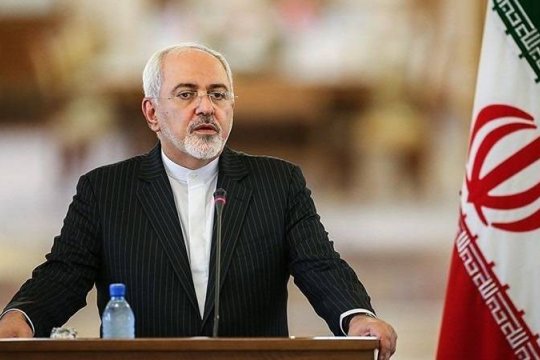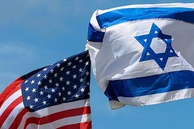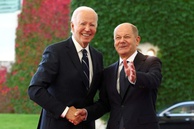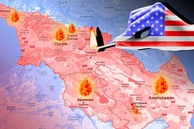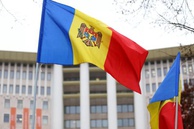The Islamic Republic of Iran (IRI) demonstrated unprecedented foreign policy activity in August as Iranian Foreign Minister Mohammad Javad Zarif visited Finland, Sweden, Norway, France, China, Japan, and Malaysia in the second half of the month, and Russia – in early September.
Tehran’s genuinely belligerent spirit is due to the situation in which it found itself in connection with the US sanctions. The United States withdrew from the Joint Comprehensive Action Plan (JCPOA) in May 2018. On August 7, 2018, Washington slapped the first package of restrictive measures on Iran that hit the Iranian car-manufacturing industry, as well as its trade in gold and other precious metals. In November the same year, the United States imposed sanctions on the Iranian energy sector and disconnected Iran from the international interbank system SWIFT. True, from November to May 2019, the White House provided benefits for the purchase of Iranian oil to eight countries (China, India, South Korea, Japan, Taiwan, Turkey, Greece, Italy). But this period is over.
In April 2018, Iran exported about 2.5 million barrels per day (b/p/d) [i]. In July 2019 this figure dropped to 100 - 120 (taking into account condensate and light oil) thousand b / d [ii], that is, decreasing by 25 times. Accordingly, oil revenues, which make up a significant part of the Iranian budget, have plummetted (according to various sources, from 25 to 40%). As a result, the socio-economic situation in Iran is deteriorating as prospects for settling the crisis appear dim and illusory as long as the problem of sanctions persists.
Undoubtedly, Tehran has consistently been trying to find a way out of the confrontation with the United States. The parties involved are playing it tough, with the game being fraught with unpredictable consequences. A lot is at stake, first of all, security in the Middle East and maybe, all over the world.
The current intrigue is about whether Iran and the US are ready to strike a compromise in their mutual claims. Where is the “red line” they are unable to go over? It has to be underscored that neither Tehran nor Washington plan to sort out the conflict by war.
Iran’s claims to the US are numerous. The main thing for now is that the United States ought to lift anti-Iranian sanctions and return to the JCPOA.
The United States too has a list of requirements for Iran, which boil down to five main ones:
1. Transformation, breaking the nuclear deal (JCPOA) in order to block the possibility of creating nuclear weapons by Iran, including by introducing an open-end validity period for the document.
2. A ban on the creation of ballistic missiles in Iran.
3. Setting a limit on Iran’s military policy in the Middle East, Syria, Iraq and Yemen.
4. No more support for terrorist organizations, primarily Hezbollah and Hamas.
5. Human rights in Iran.
The latter requirement is clearly optional, is purely propagandistic, so, in all likelihood, it will not be on the agenda of a possible Iranian-American dialogue – be it in absentia, directly or with the help of intermediaries.
Now about the players, who run this complicated, at times confusing and even contradictory game.
Naturally, the role of Russia and China, as the authors of the JCPOA, is decisive. But Russia, under the current conditions, is restricted in its capacioty to exert any practical influence on Iran and / or the United States apart from devising proposals, recommendations and evaluating the process of solving the JCPO problem.
For China, the "Iranian-American problem" is a tool in the fight against the United States on the globally extensive fronts of the US-Chinese trade war. Beijing’s policy towards Tehran will largely depend on the results of this war. Improvement of Sino-US relations would mean a cooling toward Iran and vice versa.
What is essential given the situation is the position of Scandinavian countries, which are home to a large number of Iranian emigrants. What is also important is that Scandinavia has traditionally good economic ties with Iran. A large role in the settlement of Iranian problem belongs to Japan. Perhaps, it is these considerations that determined the August visits of the Iranian Foreign Minister Zarif, which covered these countries. It was vitally important for the head of the Iranian diplomacy to win support or, in any case, explain to the leaders of these states the Iranian views on resolving the “Iranian-American problem”, particularly now that the political games are approaching their peak.
Considering all this, it should be recognized that at present, the future of the JCPOA and Iran is determined by three players - Iran proper, the United States and the European Union. Significantly, the European Union from the very beginning opposed the anti-Iranian policy of US President Trump, spoke against America’s withdrawal from the JCPOA, and came up against the imposition of sanctions. At the same time, the EU, while insisting on maintaining the JCPOA and lifting (easing) sanctions, like the United States, will not accept Iran’s missile program, its Middle East policy, Tehran’s support for Hezbollah and Hamas, or problems with human rights in Iran.
Tactically, however, there are tangible differences between the positions of Brussels and Washington. The EU is not ready to solve all Iranian problems at once and is trying to create conditions for the resumption of the negotiating process, primarily between Iran and the United States, without pressure on Iran, without sanctions.
The EU has launched INSTEX, a tool for supporting trade settlements with Iran. And even though it is ineffective, but the Europeans (unlike the Iranians) hope that everything will work out well.
At present, of the three EU countries participating in the 2015 nuclear deal (Germany, France, Great Britain) France is taking the lead to settle the Iranian issue. It is clear that Britain will leave the EU at the end of October 2019, although it will continue to cooperate with the European Union on all foreign policy issues, including Iran. [iii] German Chancellor Angela Merkel - a symbol of Germany and an authoritative but unofficial EU leader - will soon resign. Given the conditions, French President Emmanuel Macron - young, active, persistent, with ambitions akin to General Charles de Gaulle, has a chance to become Europe’s political heavyweight No. 1.
In fact, President Macron has become a mediator between Iran and the United States. The agenda of the recent G7 summit in the French city of Biarritz (August 24 - 26) included relations with the IRI but no one had expected any surprises in this area. Suddenly, on August 25, at the initiative of President Macron, Iranian Foreign Minister Mohammad Javad Zarif arrived in Biarritz. The head of Iranian diplomacy held talks with several leaders, and even planned a meeting with the US president. However, Trump did not receive Zarif.
Nevertheless, at a press conference that took place on the last day of the summit, Trump answered a question on Iran in a much friendlier manner than one might expect. “If the circumstances are right, I would surely agree to this [a meeting with Iranian President Hassan Rouhani. VS.] ”In addition, Trump described Rouhani as “an excellent negotiator,”and the Iranians as “nice people,” and expressed confidence that“Iran can become a great power, but they should not have nuclear weapons.”[iv]
The very next day, on August 26, Iranian President Hassan Rouhani said: “If only I knew that visits by and meetings with a certain person could help my country and solve the problems of my people, I would go for it” [v] - apparently, there is a hint at possible negotiations with President Trump.
Would they be possible - such negotiations? Observers and political analysts are at odds about it. Some argue that such an option is unlikely. Others say why not. After all, Trump met with Kim Jong-un - the dictator of North Korea. It was Trump’s press conference and the reaction to his speech by Rouhani that prompted rumors that the presidential summit could be held in New York on the sidelines of the UN General Assembly, which goes into session on September 17.
Of course, it is difficult to make any predictions to this effect, since it is more than challenging, particularly for Iranians, to set the distance that they and the Americans must cover to meet each other halfway, forgetting about their mutual phobias.
Despite all his so-called unpredictability, which analysts endlessly talk about, Trump is constantly resorting to the professional tactics of a hardcore businessman by offering his counterparties excessive requirements or largely unrealistic or unacceptable conditions and thereby drags them into negotiations during which he makes some concessions.
The Iranians find it harder. While the need for compromise in a dialogue with the United States to lift or at least ease sanctions is beyond doubt, the Iranian authorities can not lose face. Any compromise should look like a victory. This is what causes difficulty. Both President Rouhani and Foreign Minister Zarif in their foreign policy efforts have to constantly look back on their domestic audience, first of all, on their political opponents from the radicals who abhor either the JCPOA or any negotiations with the West, more so with the United States.
It was no accident then that almost immediately after Foreign Minister Zarif’s talks at the G-7 summit, he reiterated that no meetings with US officials would be possible unless Washington returned to the JCPOA, while President Rouhani confirmed that lifting the sanctions was the main condition for negotiations.
To harmonize all the requirements of Iran and the United States is practically impossible as Tehran (at least, officially) will never agree to curtail its missile program and drastically change its policy in the Middle East (although a gradual process of reducing military activity there is possible, given that the Middle East policy is not very popular inside the country either).
And President Trump is not ready for an instantaneous lifting of sanctions, especially now that the 2020 presidential race is right round the corner.
Given the situation, it is clear that the two parties are to work out something in-between, a kind of intermediate, temporary solution. At the same time, official Iranian-American negotiations, perhaps at the highest level, remain issue number one.
French President Emmanuel Macron is doing his best to assist with solving the Iranian problems. A settlement plan he has devised received the approval of European diplomats a few days ago. Although no details of the plan were released in the media, unconfirmed reports say it provides for the lifting of sanctions for some buyers of Iranian oil and gives Iran an opportunity to export about 700 thousand barrels of oil per day. This is more than two to three times its current volume. In addition, it is planned to provide Iran with a credit worth about $ 15 billion so that it could use hard currency to circumvent the US sanctions imposed on it. [vi] In response, Tehran is expected to get ready for negotiations and return to the meticulous implementation of the JCPOA.
In accordance with the plan, Iran undertakes to find a way to reduce tensions in the Persian Gulf amid the recent spate of tanker seizures and to begin well-structured negotiations on missiles, regional issues and on what will happen after 2025, when the current agreement expires. [vii]
In this regard, French Foreign Minister Jean-Yves Le Drian has said that it is not yet clear whether the US will refrain from sanctions on additional exports of Iranian oil. However, there have been no signals from the White House that the American president could block this initiative. Referring to France’s plan to save the deal, Iran’s Deputy Foreign Minister Abbas Araghchi made it clear that the US had shown flexibility. [viii] Of course, the deputy foreign minister could not but add that this is the result of Iran’s maximum resistance in the face of maximum pressure from the US. For Iran this is all but a new victory.
Considering these far from clear circumstances, there is one factor that could ruin the positive tendency that manifested itself at the beginning of September. This factor has to do with Iran’s steps to cut its nuclear deal commitments.
The fact is that September 5 marks the end of the second sixty-day period of Tehran’s gradual withdrawal from implementing certain requirements under the nuclear agreement [ix].
In this regard, the Iranian Foreign Minister Zarif has presented an ultimatum to the European Union: “If Europe does not take the required steps till Thursday (September 5), then, according to the decision of May 7, Iran will notify them of the launch of the third stage of withdrawal from the JCPOA.”[x] As stated by Iranian Foreign Ministry spokesman Abbas Mousavi, “the third step is fully developed and is ready for implementation. It is tougher than the first and second ones and was designed to achieve a balance between the rights and obligations of Iran under the JCPOA."[xi]
On September 2, Iranian Foreign Minister representative Abbas Araghchi and a group of economists flew to Paris to discuss Emmanuel Macron’s plan and at the same time to clarify the details of the third step of the IRI towards an exit from the JCPOA.
Iranian diplomats say that if the diplomatic efforts of Iran and the EU achieve a result, Tehran will abandon the third step. [xii]
At present, the political and diplomatic situation around Iran is centered on the French plan. There are still many questions to answer but the main ones are two. First, will it be in the interests of Iran (that is, will Tehran accept it)? Second, will the US hinder the implementation of this plan? French diplomacy has worked with both sides. Moscow has expressed support for this initiative.
There is hope for the approval of the plan. For President Trump a further aggravation of the situation involving Iran in the run-up to the 2020 presidential race is undesirable, to say the least. After all, nobody knows what the ongoing escalation of the conflict will lead to. What is clear is that this escalation will become worse in case the French plan falls through.
For Iran, the export of oil and a 15-billion loan are more than important. All Tehran has to do in return is to abandon the process of reducing its obligations under the JCPOA. The other points of the plan can well be under long and tedious discussion with the European Union - up to the presidential election in the United States. And then, there is a chance that Trump will lose and the Democrats will win.
The opinion of the author may not coincide with the position of the Editorial Board
[i] Alex Lawler. Hit by sanctions and rising tensions, Iran's oil exports slide in July. IA Reuters website, July 30, 2019. [Electronic resource] - URL: https://www.reuters.com/article/us-oil-iran-exports/hit-by-sanctions-and-rising-tensions-irans- oil-exports-slide-in-july-idUSKCN1UP1UD
[ii] Ibid.
[iii] Website of TASS Information Agency [Electronic resource] - URL: https://tass.ru/mezhdunarodnaya-panorama/6823187
[iv] The website of Moskovsky Komsomolets [Electronic resource] - URL: https://www.mk.ru/politics/2019/08/27/francuzskaya-khitrost-eksperty-ocenili-vozmozhnost-vstrechi-prezidentov-ssha-i- irana.html
[v] Website of the Washington Institute for Middle Eastern Policy [Electronic resource] - URL: https://www.washingtoninstitute.org/policy-analysis/view/is-iran-negotiating-its-way-to-negotiations
[vi] Wall Street Journal publication site [Electronic resource] - URL: https://www.wsj.com/articles/european-diplomats-swing-behind-french-effort-to-ease-u-s-iran-tensions-11567205525
[vii] Bloomberg news agency website [Electronic resource] - URL: https://www.bloomberg.com/news/articles/2019-08-24/trump-unlikely-to-bite-on-macron-s-plan- to-end-iran-standoff
[viii] Website of the Trend News Agency [Electronic resource] - URL: https://www.trend.az/world/other/3112160.html
[ix] On May 8, 2019, President Rouhani announced that Tehran was suspending part of its obligations under the JCPOA and giving other participants 60 days to return to its implementation. Such steps by Tehran’s decision will be carried out every 60 days.
During the first term (8.05 - 6.07.), Iran began to accumulate uranium enriched up to 3.67% above 300 kg permitted by the JCPOA, and heavy water above the established 130 tons.
In the second (7.07. - 5.09.), Tehran increased the level of uranium enrichment above the permissible 3.67% and suspended the process under which the heavy water reactor R-40 in Arak was to be restructured into a condition that does not allow the production of weapons-grade plutonium.
[x] Website of the IRNA news agency [Electronic resource] - URL: https://ru.irna.ir/news/83461088/%D0%97%D0%B0%D1%80%D0%B8%D1%84-% D0% 98% D1% 80% D0% B0% D0% BD-% D0% BC% D0% BE% D0% B6% D0% B5% D1% 82-% D0% BE% D1% 82% D0% BA% D0% B0% D0% B7% D0% B0% D1% 82% D1% 8C% D1% 81% D1% 8F-% D0% BE% D1% 82-% D1% 82% D1% 80% D0% B5% D1% 82% D1% 8C% D0% B5% D0% B3% D0% BE-% D1% 88% D0% B0% D0% B3% D0% B0-% D0% BF% D0% BE-% D0% A1 % D0% 92% D0% 9F% D0% 94
[xi] Website of the IRNA news agency [Electronic resource] - URL: https://en.irna.ir/news/83461525/%D0%98%D1%80%D0%B0%D0%BD-%D1%82% D1% 80% D0% B5% D1% 82% D0% B8% D0% B9-% D1% 88% D0% B0% D0% B3-% D0% BF% D0% BE-% D1% 81% D0% BE % D0% BA% D1% 80% D0% B0% D1% 89% D0% B5% D0% BD% D0% B8% D1% 8E-% D0% BE% D0% B1% D1% 8F% D0% B7% D0% B0% D1% 82% D0% B5% D0% BB% D1% 8C% D1% 81% D1% 82% D0% B2-% D0% B2-% D1% 80% D0% B0% D0% BC% D0% BA% D0% B0% D1% 85-% D0% A1% D0% 92% D0% 9F% D0% 94-% D0% B3% D0% BE% D1% 82% D0% BE% D0% B2
[xii] Website of the IRNA news agency [Electronic resource] - URL: https://ru.irna.ir/news/83460457/%D0%97%D0%B0%D0%BC%D0%B3%D0%BB%D0 % B0% D0% B2% D1% 8B-% D0% 9C% D0% 98% D0% 94-% D0% 98% D1% 80% D0% B0% D0% BD% D0% B0-% D0% BF% D0% BE% D1% 81% D0% B5% D1% 82% D0% B8% D1% 82-% D0% A4% D1% 80% D0% B0% D0% BD% D1% 86% D0% B8% D1 % 8E
read more in our Telegram-channel https://t.me/The_International_Affairs

 15:00 12.09.2019 •
15:00 12.09.2019 •
